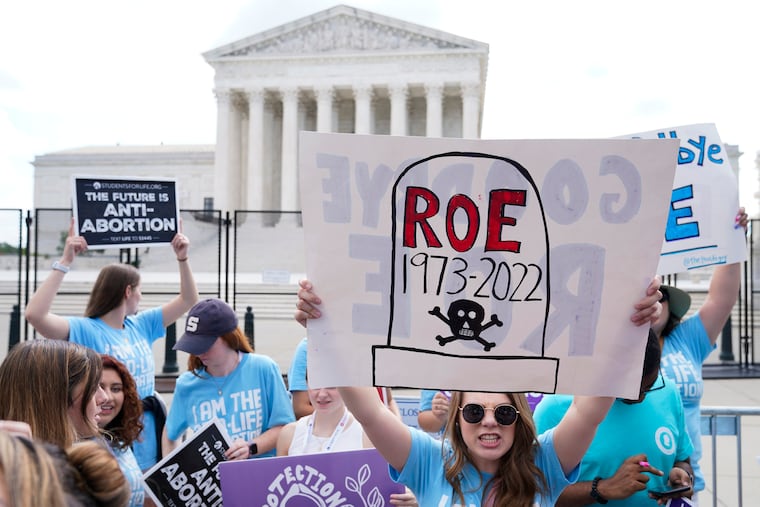Since ‘Dobbs,’ states with abortion bans far outpace those offering paid family leave
Our research found that none of the 25 states that ban or severely limit abortion offer any paid family leave. This double whammy of mandated birth and state neglect has grave health consequences.

Imagine living under a government that dictates one of life’s most consequential decisions. A decision that has profound mental, physical, and economic implications. Now imagine that this same government, after forcing your decision, leaves you without any support in the aftermath.
For millions of people living in half of the country, this isn’t a dystopian fantasy. For those of us living in Pennsylvania, it could become our reality.
Saturday marks one year since the U.S. Supreme Court broke with nearly a half-century of precedent and eliminated federal protections for abortion rights with its decision in Dobbs v. Jackson Women’s Health Organization. In the months since, our research shows none of the 25 states that ban or severely limit abortion offer any paid family leave. And two-thirds of these states go further — banning, via preemption, local and city governments from enacting paid family leave policies of their own.
If you live in one of these states, your government can essentially force you to give birth. Your postpartum options? Immediately return to work or go without pay.
This double whammy of mandated birth and state neglect has severe consequences. In states limiting abortion access, maternal mortality rates are higher and birthing people are more likely to have children who are born too early or who die within their first year of life.
Birthing people with paid family leave experience better physical and mental health outcomes, and their infants’ health is also more robust. Studies suggest that the harmful effects of denying family leave will only intensify in states where abortion is banned altogether. These policies intersect with the concept of reproductive justice, which expands reproductive rights to include not just individual choices, but access to care and the ability to raise a family in health and safety.
As with many health outcomes, the adverse effects of these restrictions are exacerbated for pregnant people of color because of the impact of structural racism. Republican governors and legislatures in the 17 states that block cities from enacting paid family leave laws and restrict abortion access have also largely blocked policies that support reproductive justice and reduce health inequities, including Medicaid postpartum coverage, a higher minimum wage, and paid sick leave. Removing or limiting abortion access reinforces harms already perpetuated by states that fail to support pregnant and parenting people.
State governments are sending a clear message: You don’t control your bodies, your health, or your career. We do.
In our lived American dystopia, state governments are sending a clear message: You don’t control your bodies, your health, or your career. We do.
Of the other 24 states and Washington, D.C., where abortion remains accessible, only 13 offer paid family leave. Pennsylvania is not one of them.
In the commonwealth, restrictions on abortion access include a 24-week abortion ban, state-mandated counseling and a 24-hour waiting period, a ban on state Medicaid and health exchange coverage of abortion services except in very limited circumstances, required parental consent for minors, and medically unnecessary regulations that limit abortion provider and clinic availability. And there is no statewide paid family leave policy.
Although the recently passed federal Pregnant Workers Fairness Act requires covered employers to provide reasonable accommodations for pregnant employees, and the Family Medical Leave Act provides some categories of workers with unpaid leave, the United States remains the only high-income country without a single day of guaranteed paid family leave.
Last month, Minnesota became the 13th state (including D.C.) to provide parents with paid time off to care for their infants. It is the only state in the Midwest with paid family leave and one of only three Midwestern states where abortion services remain accessible. Pennsylvania has become the opposite: a state that restricts residents’ rights that is surrounded by states that provide better opportunities for working people and families. The ability to receive pay from work in the weeks preceding and following birth should not be a privilege, especially in the richest country in the world.
Other state-level paid family leave programs have failed to pass statehouses in past years. But the Dobbs decision shifts the landscape, making the importance of paid family leave even more poignant.
As states that continue to provide abortion consider their role in protecting access to care and allowing birthing people to raise a family in health and safety, paid family leave needs to be part of the conversation.
States that restrict abortion, such as Pennsylvania, should enact paid family leave policies or repeal their preemption, letting cities provide these benefits to their residents. The least they can do after forcing parents to give birth is to allow them paid family leave.
Alina Schnake-Mahl is an assistant professor in the health policy and management department and the Urban Health Collaborative at the Dornsife School of Public Health at Drexel University. Jaquelyn Jahn is an assistant professor who works in the department of epidemiology and biostatistics and at The Ubuntu Center on Racism, Global Movements, and Population Health Equity at the Dornsife School of Public Health.